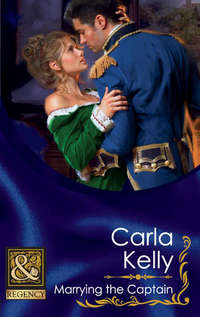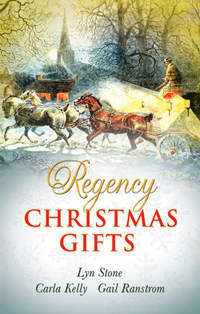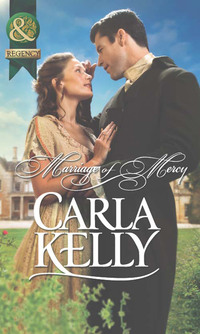
Полная версия
Regency Christmas Wishes: Captain Grey's Christmas Proposal / Her Christmas Temptation / Awakening His Sleeping Beauty
‘Sir,’ he whispered under his breath to the Lord above. ‘Help me know what to do.’
Once Teddy was inside, Hollinsworth’s expression changed to his usual cheery demeanour. Jem understood. ‘Captain Grey, we’re going to let every flying insect into this print shop. Hurry up and come in!’
He hurried, closing the door after him. Teddy stood behind the drafting table, as if afraid of them both. Her eyes were huge in her face until Hollinsworth bowed from the waist and introduced himself. To Jem’s relief, she smiled.
‘Miss Winnings, I had to do something to get this slow-moving captain out of the street. He doesn’t understand Savannah the way we do, does he? Do have a seat, please. No one here is going to harm you.’ The printer gestured toward the stool in front of the drafting table. He propped a broom against it. ‘If anyone sets the doorbell tinkling, start sweeping.’
Teddy nodded and sat. With a pang, Jem watched her smooth down the rough fabric of the shapeless dress she wore, recognising the graceful gesture from many a time when she sat beside his bed in the hospital in much better clothing. His heart eased, as he realised Teddy was still Teddy.
Jem had to admit that Osgood N. Hollinsworth had a certain charm, something he had not noticed before in their various exchanges. Teddy appeared to relax as the tension left her face. ‘Yes, Sir,’ she said. ‘I can sweep.’ Jem saw the dimple in her cheek and relaxed further. ‘No one will know I don’t belong in here.’
The capable, assured, confident post captain that James Grey knew himself to be had vanished. He stood there like a lump, awkward as though his feet and hands were five times larger than usual. At least so he felt, until Hollinsworth took his arm in a surprisingly gentle grip and motioned him toward the other chair beside the drafting table.
Hollinsworth regarded them with something nearly resembling beatific goodwill toward men. ‘Talk,’ he said. ‘I am going to the Marlborough for some food. Captain, do you have any money? You know what a poverty-stricken editor I am. Why is it writers cannot make an honest dime?’
Wordless, Jem reached inside his coat and took out several bills. ‘What do you like to eat, Teddy? I remember macaroons and something with pecans.’
She smiled for the first time, and Jem felt his heart cuddle down into a little pile. ‘You remember well... Jem?’
‘That’s still my name,’ he said, even though all he had heard in years was Captain Grey, or something more informal. ‘My men call me Iron Belly, but only out of my hearing.’
Her smile grew larger. ‘I recall a time when all you did was puke.’
Hollinsworth rolled his eyes. ‘My land! Eleven years and this is the best you two can do? I’m going, before I smack you both!’
Jem laughed, and Teddy put her hand over her mouth, a gesture he remembered as though the hospital was mere days ago, when she was a lady and too polite to laugh out loud.
‘Fried chicken and greens? Corn bread?’ Hollinsworth asked. ‘Crab sandwiches?’
‘It all sounds wonderful, sir,’ Teddy said. ‘I haven’t had chicken in a long time.’
The door closed, and Jem absorbed the sight of Theodora Winnings, still the loveliest woman he had ever seen, and he had been in many a foreign port since his proposal by letter. He wished he could tell her he had been a chaste, celibate man, but that would have been a lie. He wished he had received her letter years sooner.
He could have said all that; instead, he held out his hand to her. He could have died with delight when she held out her hand and grasped his in a firm hold. Her hands were rough and her grip strong, much like his own. He remembered her delicate touch and the softness of her hands, but much time and many tides had rolled over them both since he wrote that letter and she answered it.
She opened her mouth to speak. He held up his free hand, ready to break a social rule.
‘A gentleman would let you speak first, Teddy, but I have to start. I won’t have you apologise for anything when I owe you the apology.’
It didn’t work. ‘Jem, I’m a slave. I always was. I never told you.’ Her voice was low and earnest. ‘It was wrong and I’ve regretted it for years. May I please apologise first?’
‘No, you may not.’ He felt like he floundered, but he was still a man used to command. ‘Teddy, I didn’t get your letter until September.’ He reached in his pocket and pulled out the fragile thing, setting it carefully on the drafting table. ‘You see what I could read. Mrs Fillion had set a box on top of it, and there it remained for years.’
‘You told me to send a letter care of the Drake,’ she said. ‘Her hotel?’
‘We officers of the fleet based in Plymouth have long used the Drake as an informal place to store our personal effects. Everyone passes through there sooner or later,’ he explained. ‘What happened in this case is that the owner of the box on top of your letter died.’
‘So there it sat,’ she said with a sigh.
‘Every so often, Mrs Fillion advertises in the newspaper, listing the names and property, hoping next of kin will claim the items,’ he said. ‘Someone finally did. I happened to be in port when she found the letter underneath.’
‘And you dropped everything and ran away to the United States? Captain Grey, I don’t remember you as an impulsive person. Aren’t you at war? Did you bring your frigate with you?’
The way her eyes twinkled made him laugh. Funny how they had picked up where they left off. When his malaria fevers had begun to subside and he lay there in the convent, stupefied and even unsure where he was, Theodora Winnings had jollied him out of the doldrums by reading a book of wise remarks and tomfoolery by Benjamin Franklin. He knew she liked to laugh, and by God, he could have used a few laughs in the past decade.
‘There is no war right now. First Consul Bonaparte has foisted the Peace of Amiens on us.’
‘That’s a good thing, I would imagine, Jem.’
He smiled to hear her affectionate name for him. Amazing how eleven years could nearly vanish. With a start, he realised that since his parents’ deaths years ago, no one called him that except Teddy Winnings.
‘Amiens is good for me,’ he assured her. ‘Most of us post captains were thrown ashore on half pay, which meant I could book passage on the first ship to the United States and the Royal Navy is none the wiser.’
‘You came all this way without knowing even where I was or whether I was alive or dead?’ she asked.
He heard the wonder in her voice. He could assure her that was the truth, or he could be honest. Which would it be? He knew now she was a slave, a woman of Ashanti or Ibo origin two or three generations back, someone who had to bend to the will of others. He could chat with her, satisfy himself she was well, and leave for Baltimore at the end of the week, as planned.
He might have done precisely that, if he had not looked into her eyes and remembered what it was beyond her amiability and breathtaking beauty that made Theodora Winnings so memorable. Kind eyes looked into his and he recalled with delight her amazing ability to give whomever she was talking to her complete and undivided attention. He knew it was a rare gift. He would be honest, because she was paying attention to him, completely focused.
‘Teddy, I wanted to assure myself that you were alive,’ he said. ‘I had no doubt you would be married and with a family of your own.’
‘Not this slave,’ she said. ‘Why else are you here then?’
He couldn’t help looking around to make sure British spies weren’t pressed against the front window, peering in and listening. I’m an idiot, he thought, suddenly weary.
‘You can tell me,’ she said, putting her hand over his. ‘I don’t expect you to come to my rescue. You had no idea I even needed rescuing. What else?’
Her hand was warm. He turned his over and interlocked their fingers. ‘Teddy, I wanted to go home again to Massachusetts. After I assured myself that all was well here, I was...well, I am...taking ship north to Baltimore and then to Boston.’
He felt her fingers tremble and tightened his grip. ‘You told me eleven years ago how a howling mob burned your house when you were a boy, killed your dog, and sent you all fleeing north to Halifax,’ she said. ‘Why would you ever want to return there?’
‘I liked Massachusetts,’ he said simply. ‘I wish I had a better explanation. Have you ever just liked something?’
She nodded. ‘Since we are truth telling and it sounds to me like you’ve already booked passage...’ Her voice trailed off and he heard the regret. It might have been wistfulness, or even envy that he could travel about on a whim.
‘Have you?’ he asked.
‘I liked you,’ she said, her brown eyes claiming his total attention. ‘You sailed away at Christmas, Jem. Every year I wondered how you were doing. I lit a candle every year at Congregation de St Jean-Baptiste, hoping you were still alive.’ She broke off her glance. ‘I wasn’t going to this year. I was done with it.’ She looked up and he felt his heart start to beat again. ‘But here you are, at least for now. I know you are alive and I suppose that must suffice.’
‘Then why are you crying?’ he asked, his voice soft.
Chapter Eight
The shadow of a man passed the door and Teddy gasped, tears forgotten. She grabbed the broom and began to sweep a floor that looked as though it had not been touched in a generation. Dust flew and Jem sneezed.
When the footsteps receded, Jem grabbed the broom. ‘Hey now, lady, he walked on by.’
He tried to pry the broom from her grasp, but Teddy was strong and hung onto it. ‘You don’t understand that I am a slave and this is the South,’ she said and yanked on the broom. ‘Let go.’
Jem released the broom, acutely aware of the terror in her eyes. He watched her edge toward the door and knew he had no incentive to keep her there, if she wanted to leave. Her fear told him chapter and verse of what could happen to a slave alone with a white man. Eleven years had changed Theodora Winnings even more than it had changed him. Better keep talking.
‘When I did not hear from you, I was moderately philosophical about the matter, I’ll admit,’ he told her. ‘Who was I, after all? A Royal Navy first lieutenant barely alive and still shaky. I assumed you were the pampered daughter of a Charleston merchant, determined to do good in a fever hospital. I was nothing but very small fry.’
As practical as he remembered, Teddy shook her head. To his relief, she put down the broom and moved away from the door, not far, but far enough to give him reason to hope. It began to matter to him more with each passing minute that she not leave.
‘Captain Grey, no one volunteers at a fever hospital,’ she said, enunciating each word in a most un-Southern way. ‘Mr Winnings hated it, but Mrs Winnings volunteered me all the time. I had no choice.’
‘My God, what kind of woman is she?’ he asked.
‘A sad woman who could not produce any children of her own and could only look on as I was born and cherished by her husband,’ Teddy told him. ‘He even taught me to read and write, which is illegal, I assure you.’
‘White folks are afraid you’ll get ideas?’ he asked, unable to mask his disgust.
‘Most likely.’ She sat down. She smiled at him, and years fell away. ‘Don’t get a swelled head, Captain Grey, but going to the fever hospital became the best part of my week.’
The smile left her face soon enough and she settled into that neutral expression he had seen on many a slave’s face in his brief tenure in the South. ‘I should never have walked through the convent grounds with you when you started feeling better.’
‘Probably didn’t have a choice, did you?’ he asked, his understanding growing of Theodora Winnings’ life spent balancing on the tightrope of keeping Mr Winnings happy and not irritating Mrs Winnings too much.
‘I did, actually,’ she said. ‘For all that they were cloistered, religious women and unacquainted with actual life, some of the nuns could see what was happening between us. They told me I should find another patient, or at least tell you of my parentage.’ Her expression softened. ‘They didn’t order me away, however.’
As he watched her, Jem wondered how easy it would have been to ignore that ruin of a letter Mrs Fillion gave him. He could still be in England, restless at being ashore on half pay, and thinking about nothing more interesting than what he would be having for dinner that night. All things considered, this was better. Come to think of it, any time at all in Theodora Winnings’ gentle orbit was better. Maybe this was his odd little Christmas gift from St Nicholas.
She sat back on the chair, her guard down again. ‘Every morning before I went to the hospital, I told myself it would be the last time. I ordered myself to tell you I was a slave, and every morning, I could not.’
In for a penny, in for a pound, he thought. ‘The thing is, Teddy, it would have changed nothing,’ he said and took his own deep breath. ‘I remain firm in my resolve.’
‘You can’t be serious,’ she replied.
‘Never more so.’
‘Even if you know any sort of...connection between us is impossible?’ she asked.
He shrugged. ‘Why? I assume you could not tell me the truth because you loved me.’ He touched the ruined letter on the drafting table. ‘Your letter confirmed it eleven years ago.’
Teddy opened her mouth to speak, then gasped as another shadow approached the door and opened it. She leaped to her feet and crouched behind the drafting table as Osgood Hollinsworth opened the door, bearing a pasteboard box of food.
Go away and let me talk to this lady, he wanted to shout as Mr Hollinsworth set the box on the desk.
‘You can talk after we eat,’ the printer said. ‘I’m not going anywhere until we do. Chicken, greens, Johnny cake!’
How was it that this round little man seemed to know what he was thinking? I am losing my mind, Jem thought, exasperated.
‘Captain Grey! Coax that pretty miss out from behind my drafting table. You can be as high-minded as you wish, but we need to eat. You know, as we puzzle out what to do.’
‘There is nothing we can do,’ Teddy Winnings said as she left her hiding place and sat where Mr Hollinsworth pointed.
Hollinsworth blinked his eyes in surprise and clucked his tongue. ‘Missy, you have a lot to learn. Doesn’t she, James?’
Hollinsworth looked from one to the other, smiling as though all was well in the world. ‘Must I do all the thinking?’ he asked the air in general. ‘Eat something.’
Maybe the chance was gone. Teddy seemed almost relieved not to venture deeper into their conversation. She arranged the food, setting it just so, as if seeking order to a life suddenly out of kilter.
So be it. He was hungry. He could be superficial, too, although for how long he did not know. The chicken was tasty enough for Jem to ask her, ‘Miss Winnings, can you cook like this?’
‘Certainly, sir,’ she said, after she chewed and swallowed. ‘I can cook chicken anywhere.’
‘Don’t be so...so...blamed trivial!’ Hollinsworth declared, and waved a chicken leg for emphasis. ‘Miss Winnings, how did you find my broadside? Just curious.’
The soul of manners, she wiped her fingers delicately on a piece of newsprint. ‘It was the strangest thing, sir. I was hanging up the wash today when the broadside just sailed into the yard on that high wind, and dropped in my hands.’
‘There wasn’t any wind this morning,’ Jem said, reaching for another chicken piece.
‘There was,’ she insisted. ‘Are you a wind expert?’
‘Actually, I am. No wind,’ he said firmly.
She gave him a look that would have skewered a lesser man. ‘Wind. The broadside seemed to attach itself to my hand. Don’t laugh! I dropped everything and came here. You don’t know everything, Captain Grey.’
I like this spirited Theodora, he thought, but decided wisely to keep his comments to himself. ‘I bow to your greater knowledge,’ he said, unable to resist some repartee, even as he longed to yank the conversation back to her words spoken just before the printer opened the door.
Hollinsworth, damn the man, seemed to have other ideas. ‘Miss Winnings, enlighten us. What happened after your father’s death?’
She glanced at Jem, apology in her eyes, but obedient in her attention to the printer. Jem decided that the intervening years must have been a harsh school for a slave who lost her only advocate with her father’s passing.
‘Mrs Winnings sold the business, bought a house and moved us here.’ She shook her head over a thigh fried a crispy brown. ‘Savannah was her childhood home.’
Jem took heart when she turned to him and touched his arm. ‘Jem, Mr Winnings died not long after that Christmas when you sailed away. He died in January of ninety-one. When I was tending him at home because he could no longer go to the mercantile, Mr Winnings showed me his will, already notarized. Upon his death, I was to be freed and provided with two hundred dollars.’
Sudden tears spilled onto her cheeks. ‘Jem, when the will was read, there was no mention of my freedom or any money. When I asked Mrs Winnings about it in private, she said solicitors could be easily unconvinced.’ She put her hands over her ears. ‘I can hear her still.’
In the silence that followed, Jem could almost hear Mrs Winnings, too. He thought of his own life in those few months since he had left Teddy the letter, hopeful she would answer, determined to return for her, despite duty and war. Time passed. He never grew any more in stature—he was tall enough—but he grew in cynicism and then a complacent sort of acceptance, where Teddy was concerned.
‘I wish I had known,’ he said. ‘If only there was a way to know instantly what goes on in others’ lives.’ It was absurd, but he had to say it.
Teddy gave him a faint smile. ‘You can’t imagine how I prayed you would find out and save me. I prayed and prayed. Nothing.’
He bowed his head in sadness at the same time Mr Hollinsworth blew into his handkerchief, muttering something about being stretched too thin, which made no sense to Jem. At least the man felt like crying in solidarity with them. How could he be busy? Nothing seemed to happen in Savannah.
‘She sold the business and moved here,’ Jem said. He put down the chicken thigh, hungry no longer.
Teddy nodded. ‘She bought a house near Ellis Square. It burned in the fire of ninety-six and we moved to a smaller house on the edge of Green Square.’
How many times have I walked by it in the past two weeks? Jem asked himself. He amended his thought. He had only walked there once, because it was a ramshackle area, unsafe. ‘I’ve been here long enough to know that as a come down,’ he said.
‘It was,’ Teddy replied. ‘She started selling off her slaves.’ He heard the sob in her throat. ‘My friends!’
He stared into her eyes, chagrined to see that deep gaze of men who had been in combat on sea and shore. He knew he had that same stare, but he had never seen it in a woman’s eyes before and it unnerved him.
‘Theodora...’
‘I am last,’ she said quietly. ‘I believe I was her hedge against ruin.’
Chapter Nine
Reticence be damned. Jem took her arm, pulled her toward him and held her while she sobbed. Between breaths that shook her, she murmured something about card games and one losing streak after another. He listened in horror and heard the dreary pattern of a desperate widow gambling at cards, trying to recoup some shred of a formerly prosperous life.
He glanced at Mr Hollinsworth, who seemed involved in sorrow of a different sort, an inward examination. Jem had not known the man a few hours before he had seen him as a jovial fellow, with ready quips. Who was this new fellow?
He held Teddy close on his lap and realised he had not been a callow fool in 1791, infatuated by a pretty face and figure. He had told his story a few times in frigate wardrooms, usually to hoots of laughter, until he had begun to think perhaps he had been a naive boy, recovering from illness, who mistook kindness for attachment of a more permanent nature.
He held her, felt her tears dampening his coat, and understood the nature of what he had felt in 1791, love so deep it shook him even now. ‘Help me, Sir,’ he whispered to that friend of his.
He glanced at Mr Hollinsworth just then to see him nod ever so slightly, his own countenance anything but trivial, or jovial, or shallow or any of those weary adjectives describing someone lightweight.
‘Aye, laddie,’ Mr Hollinsworth said.
He let Teddy’s tears run their course, pressing his handkerchief into her palm. ‘Blow your nose and dry your eyes,’ he said. ‘I will return with you to Green Square and I will buy you. I didn’t come here penniless.’
She didn’t bother with his instruction, beyond wiping her nose, her face stained with tears. ‘You’re too late. She sold me yesterday to William Tullidge. I am only hers until after Christmas. She insisted.’
Mr Hollinsworth gasped. ‘He’s one of the richest men in Savannah. Cotton, land, slaves.’ He shook his head. ‘Influence.’
‘Then I will buy you from him,’ Jem said, undeterred. ‘What did he pay?’
‘Two thousand dollars,’ she said, then looked away, unable to meet what he knew was his own horrified gaze. ‘Do you have that much money?’
He shook his head. He had more, clearly outlined in a legal letter of transfer from Carter and Brustein to any counting house in North America, but such a transfer took months. ‘Not on hand.’
‘Then I am ruined,’ Teddy said. Dignified even in her despair, she got off his lap, straightened her dress and started for the door. She turned back to give him the level gaze that told him he commanded her total attention.
‘Captain Grey, I came here for one reason only. I know there is nothing you can do to save me, at this point.’
‘But I can tr—’
She help up her hand. ‘Stop. Let me speak. I came here solely to see you. I came here to assure my eyes—no my heart—that you are well and whole now. I came here to apologise...’ She gave him a fierce look that closed his mouth again. ‘Deny that you came here for the same reasons only. I dare you.’
She had him. ‘I came here for those precise reasons,’ he admitted, because it was true.
Her hand was on the doorknob now. He knew he had lost, but he had to try once more. He knew what he had to say would brand him forever in her eyes as a fool, but he had to try. He glanced at Mr Hollinsworth for... For what, he had no idea. Support? Compassion? Empathy? And he saw an amazing sight.
Somehow, the little round man seemed to grow a foot taller. His eyes bored into Jem’s eyes, telling him without words that he had a potent ally in this odd quest that had turned into a mission so important that he felt it in his entire being.
‘Listen to him, Theodora,’ Mr Hollinsworth said, and it was no suggestion.
‘Something happened in Charleston,’ Jem began.
Maybe Teddy felt something unusual in the dusty room, same as Jem did. Whatever it was, she walked back and sat on the stool.
‘I learned who you were in Charleston, and it didn’t send me rushing to take ship back to England,’ he said. ‘I stood outside the convent and I must have prayed. Me! I never pray.’
He looked for scepticism in those lovely eyes and saw something else. Eyes still cast modestly toward her bare feet, she smiled.
He couldn’t help his sudden intake of breath. ‘Teddy, that statue,’ he said, and couldn’t think of words, he who had commanded, and fought, and blistered his frigate’s air with admonition.
Total silence filled the room. He watched dust motes dance. Theodora didn’t raise her gaze. She placed her hand near her heart. He waited, barely breathing.
‘You sailed in December of 1790,’ she said. He leaned forward to hear her soft words. ‘In September of ninety-one, a hurricane struck the city.’ Her breath came quicker. ‘The statue outside the convent literally blew away. The winds stripped all the ivy from the buildings. Such a storm.’







